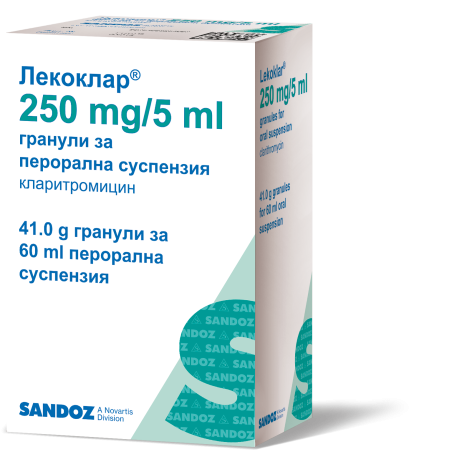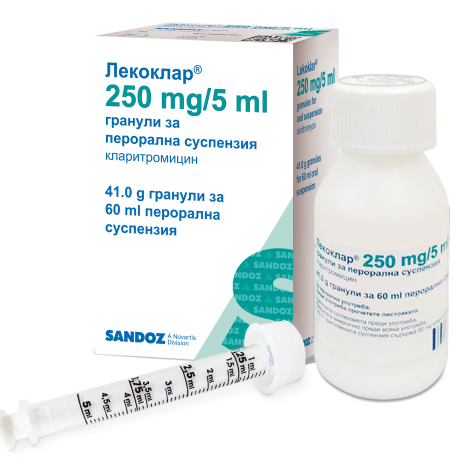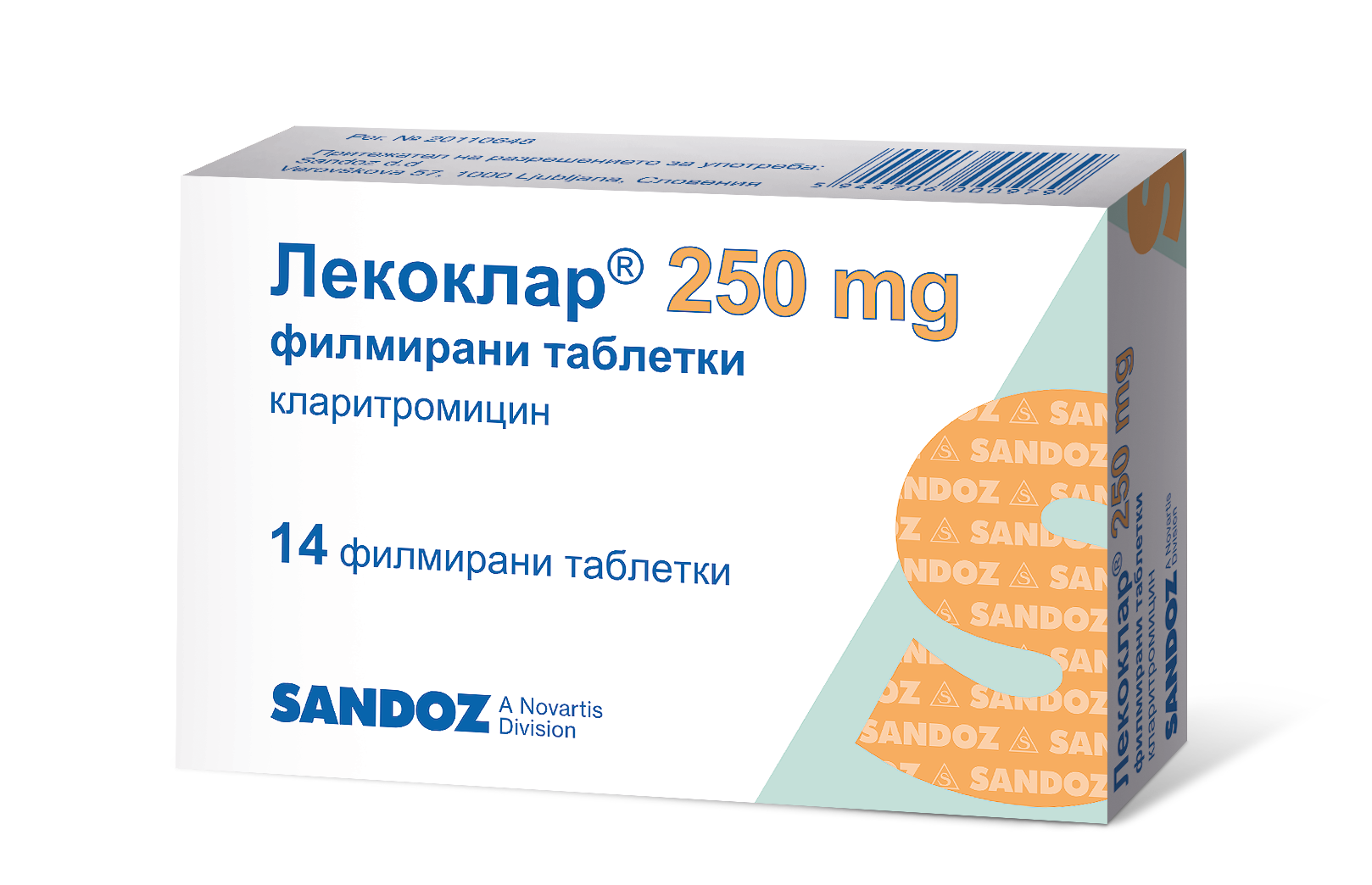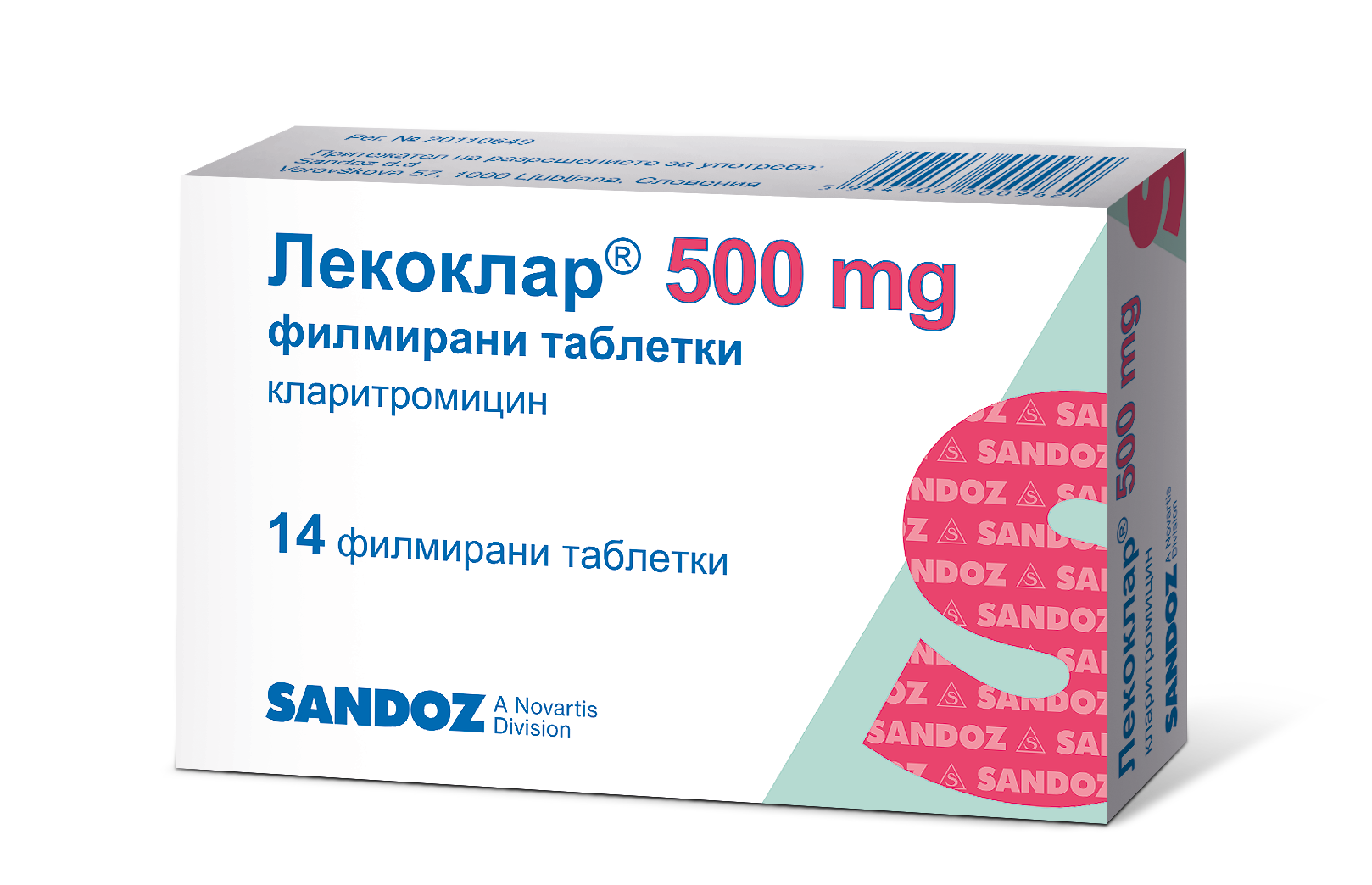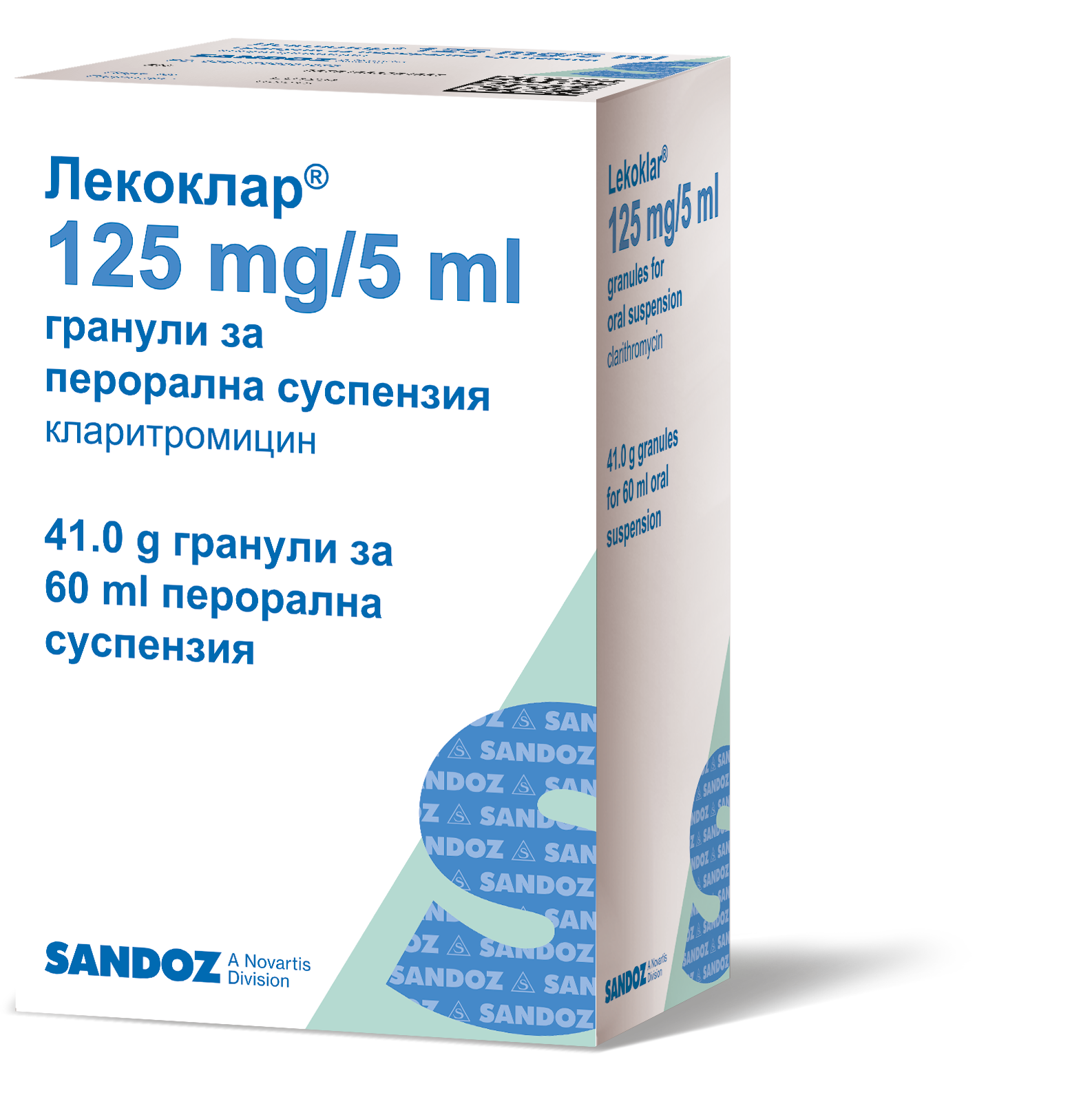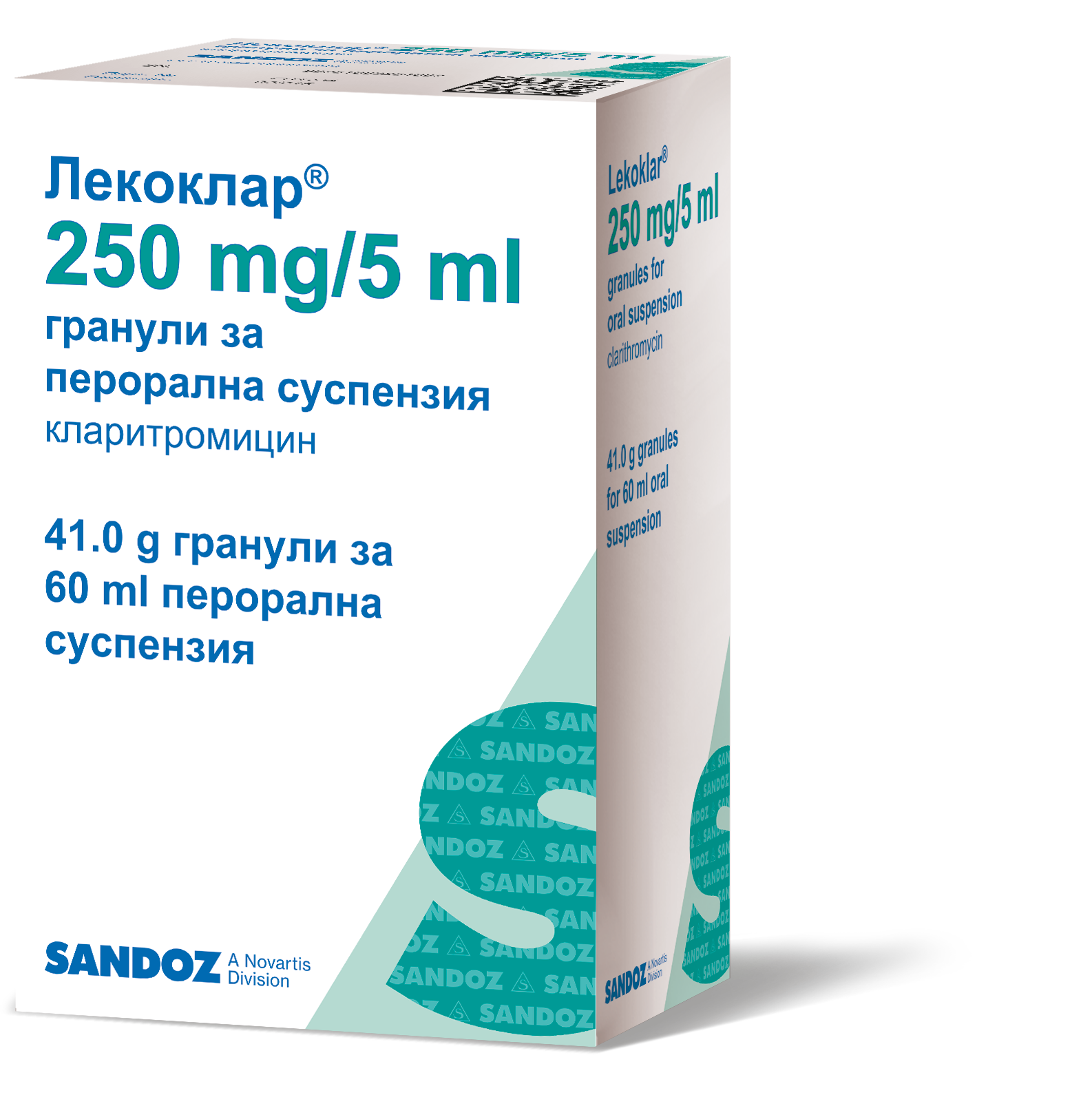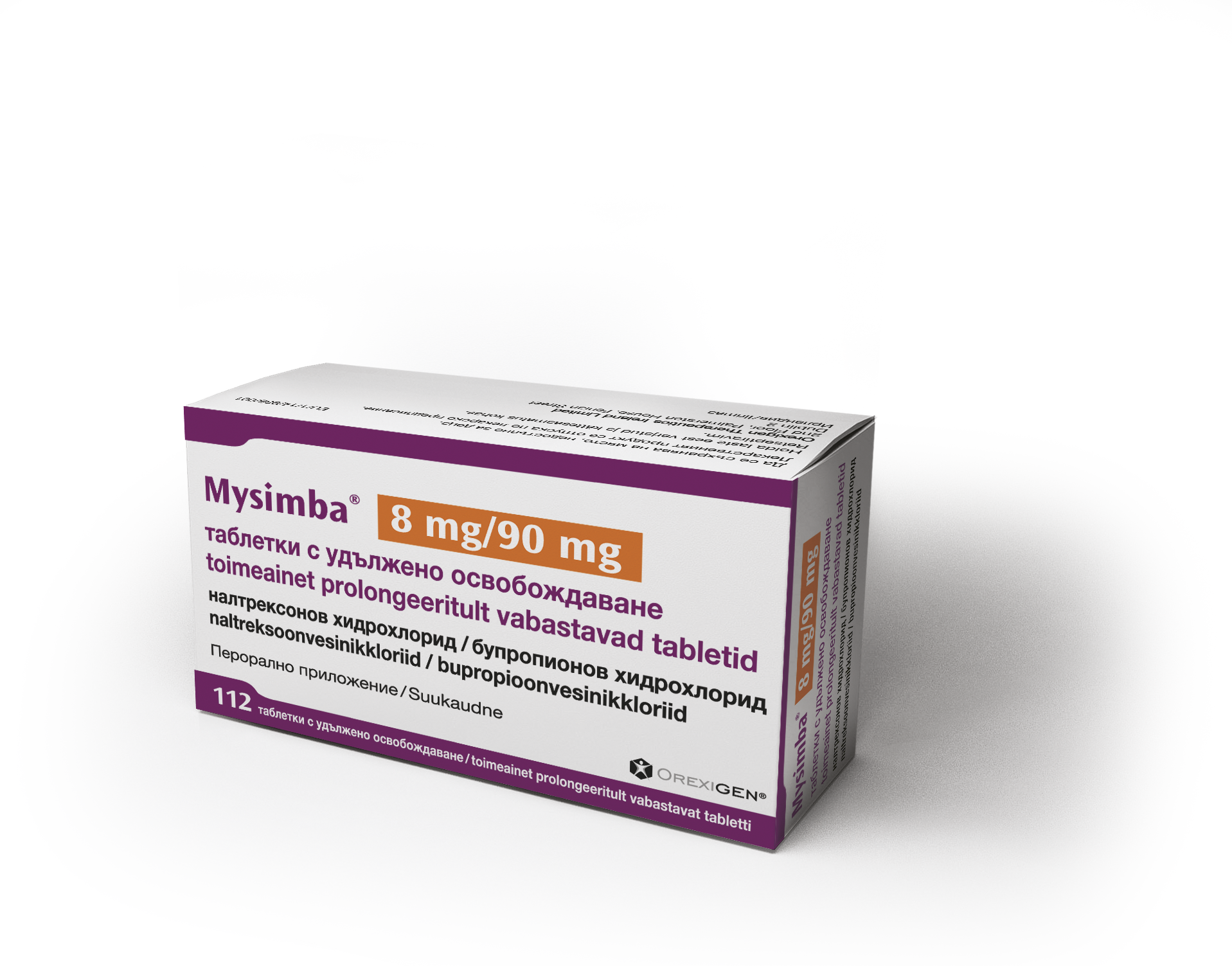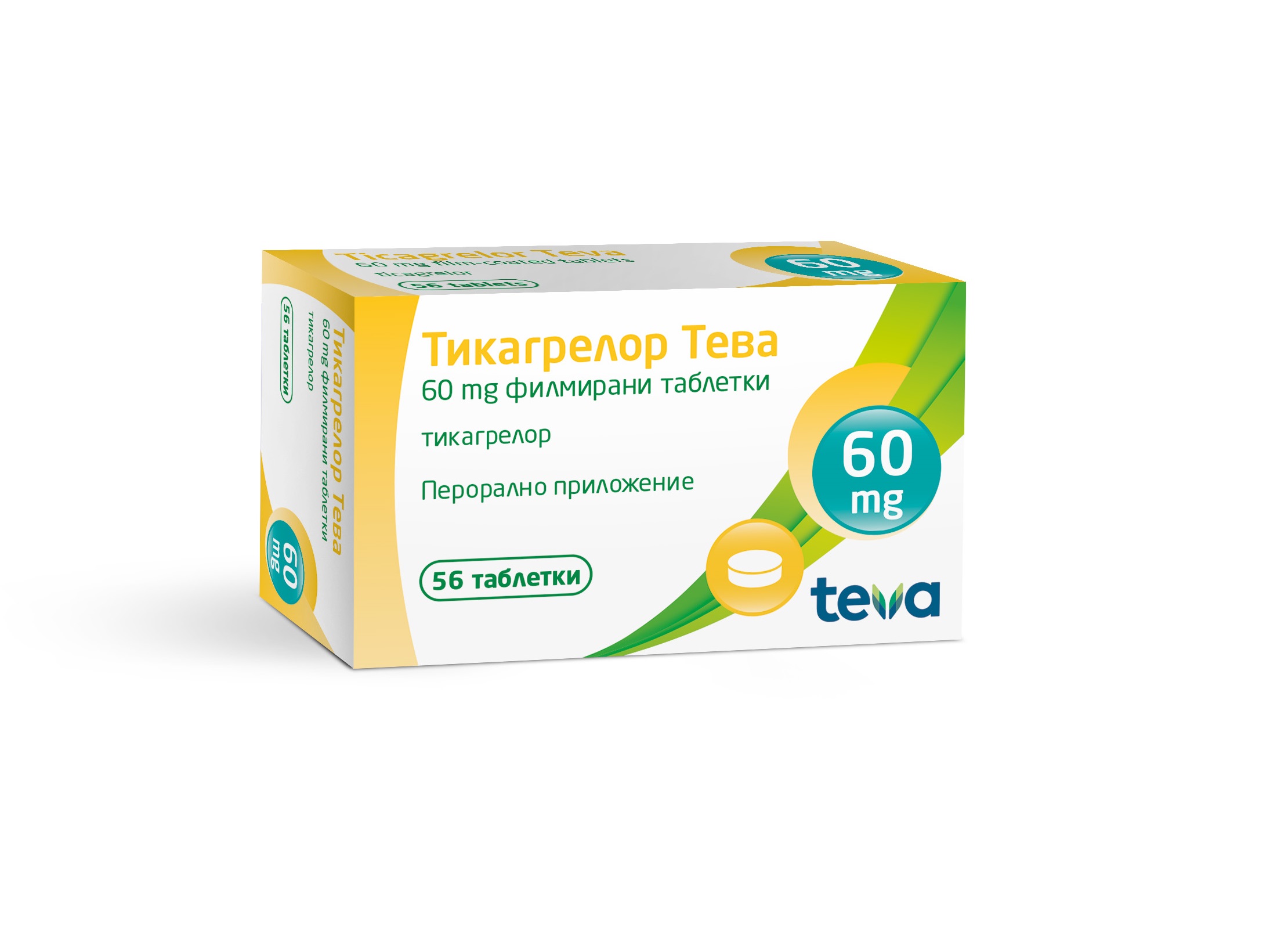LEKOKLAR gran 250mg/5ml 60ml
Leaflet: patient information
Lecoclar 125 mg/5 ml granules for oral suspension
Lekoklar 125 mg/5 ml granules for oral suspension
Lecoclar 250 mg/5 ml granules for oral suspension
Lekoklar 250 mg/5 ml granules for oral suspension
clarithromycin
Read all of this leaflet carefully before you start taking this medicine because it contains important information for you.
- Keep this leaflet. You may need to read it again,
- If you have any further questions, ask your doctor or pharmacist.
- This medicine is prescribed only and personally for you. Don't leave it to other people. It can harm them, regardless of the fact that the signs of their illness are the same as yours.
- If you get any side effects, tell your doctor or pharmacist. This also includes any possible side effects not described in this leaflet. See point 4.
What this leaflet contains
1. What Lecoclar is and what it is used for
2. What you need to know before you take Lecoclar
3. How to take Lecoclar
4. Possible side effects
5. How to store Lecoclar
6. Contents of the package and additional information
1. What Lecoclar is and what it is used for
Clarithromycin is an antibiotic that belongs to the group of macrolide antibiotics. They stop the growth of certain bacteria.
Lecoclar is used to treat:
- throat and sinus infections
- middle ear infections in children
- chest infections such as bronchitis and pneumonia
- skin and soft tissue infections
- stomach ulcers caused by the bacterium Helicobacter pylori.
2. What you need to know before you take Lecoclar
Do not take Lecoclar
- if you are allergic to clarithromycin, other macrolide antibiotics or to the other ingredients of this medicine listed in section 6.
- if you have or someone in your family has a history of certain heart rhythm disorders (ventricular arrhythmia, including torsades de pointes) or atypical changes in the electrocardiogram (ECG, electronic recording of the heart) called 'long QT syndrome'
- if you suffer from severe liver failure and kidney problems at the same time,
- if the potassium levels in your blood are atypically low (hypokalaemia),
- if you accept
- ticagrelor (to prevent blood clots)
- ranolazine (to treat angina)
- ergotamine , dihydroergotamine (medicines to treat migraine)
- oral midazolam (for anxiety or to help sleep)
- cisapride and domperidone (stomach medicine),
- pimozide (antipsychotic),
- terfenadine or
- astemizole (for hives, anti-allergic drugs)
- lovastatin , simvastatin (medicines to lower cholesterol)
- colchicine (to treat gout)
- other medicines known to cause serious heart rhythm disturbances.
Warnings and precautions
Talk to your doctor or pharmacist before taking Lecoclar.
- if you have reduced liver or kidney function ,
- if you have severe or prolonged diarrhea (pseudomembranous colitis) during or after taking Lecoclar, consult your doctor immediately. Inflammation of the colon (pseudomembranous colitis) has been reported with the use of almost all antibacterial drugs, including clarithromycin.
- if you suffer from myasthenia gravis , a rare disease that causes muscle weakness
- if you have diabetes
- if you have or have had heart problems, or
- if the levels of magnesium in your blood are atypically low (hypomagnesaemia)
- if you have taken clarithromycin before for various reasons and for a long time.
Other medicines and Lecoclar
Tell your doctor or pharmacist if you are taking, have recently taken or might take any other medicines, including those obtained without a prescription.
Lecoclar should not be taken with ergo alkaloids, astemizole, terfenadine, cisapride, domperidone, pimozide, ticagrelor, ranolazine, colchicine, some medicines to treat high cholesterol and medicines known to cause serious heart rhythm disturbances (see " Do not take Lecoclar")
Some other medicines can affect the effect of Lecoclar, as well as vice versa. Such drugs are:
Lecoclar can enhance the effect of the following drugs:
- ibrutinib (a medicine to treat chronic lymphocytic leukemia)
- alprazolam, triazolam, intravenous or oromucosal midazolam (for anxiety or to help sleep)
- digoxin, verapamil, amlodipine, diltiazem (heart medicines)
- theophylline (anti-asthma medicine)
- warfarin (anti-clotting medicine)
- atorvastatin, rosuvastatin (cholesterol-lowering agents)
- cyclosporine, sirolimus, tacrolimus (medicines that suppress the immune system)
- carbamazepine, phenytoin, valproate (medicines to treat epilepsy)
- cilostazol (used to improve blood circulation in the legs)
- insulin and other medicines to treat diabetes (such as nateglinide or repaglinide)
- methylprednisolone (cortisone to treat inflammation)
- omeprazole (stomach medicine)
- sildenafil, tadalafil, vardenafil (medicines to treat erectile dysfunction)
- tolterodine (to treat overactive bladder syndrome)
- vinblastine (medicine to treat cancer)
- medicines with a risk of affecting hearing, especially aminoglycosides, such as gentamicin or neomycin (a group of antibiotics)
The effect of Lecoclar and the effect of the following drugs may be enhanced when taken together:
- atazanavir, saquinavir (medicines to treat HIV)
- itraconazole (medicine to treat fungal infections)
If your doctor has specifically recommended that you take Lecoclar and any of the above medicines at the same time, your doctor may need to monitor you more closely.
The following drugs can weaken the effect of Lecoclar:
- rifampicin, rifabutin, rifapentine (antibiotics)
- efavirenz, etravirine, nevirapine (medicines to treat HIV)
- phenytoin, carbamazepine, phenobarbitone (antiepileptic drugs)
- St. John's Wort
Please note:
Ritonavir (an antiviral medicine) and fluconazole (a medicine to treat fungal infections) can increase the effect of Lecoclar.
Lecoclar can weaken the effect of zidovudine (an antiviral medicine). To avoid this, you should leave an interval of 4 hours between taking these drugs.
The use of Lecoclar simultaneously with digoxin , quinidine, disopyramide or verapamil (medicines for the heart), or other macrolide antibiotics can cause cardiac arrhythmia.
The simultaneous use of Lecoclar with disopyramide can lower blood sugar levels (hypoglycaemia).
Pregnancy and breastfeeding
If you are pregnant or breast-feeding, think you may be pregnant or are planning to become pregnant, ask your doctor or pharmacist for advice before using this medicine.
No data are available on the effect of clarithromycin on human fertility. Fertility studies in rats showed no evidence of harmful effects.
Driving and using machines
In general, Lecoclar has no effect on the ability to drive or use machines, but may cause side effects such as dizziness, confusion or disorientation. If you feel any effect, you should not drive, operate machinery or perform activities that could put yourself or others at risk.
Patients' ability to drive and operate machines may be affected by visual disturbances and blurred vision.
Lecoclar contains sucrose and sodium
This medicine contains 2.4 g of sucrose per 5 ml of ready-to-use suspension. This should be considered in patients suffering from diabetes mellitus.
If your doctor has told you that you have an intolerance to some types of sugar, contact the doctor before taking this medicine.
This medicine contains less than 1 mmol sodium (23 mg) per dose, i.e. it can be said to be practically sodium-free.
3. How to take Lecoclar
Always take this medicine exactly as your doctor has told you. If you are not sure about something, ask your doctor.
From the prescription, you can learn how much of this medicine and how often you should take it. Please read it carefully. The dose your doctor prescribes depends on the type of infection and its severity. The dose also depends on your kidney function. Your doctor will explain it to you.
Adults and adolescents:
The usual dose is 250 mg twice a day.
For severe infections or stomach ulcers caused by Helicobacter pylori, the usual dose is
500 mg twice daily.
Children aged between 6 months and 12 years:
The daily dose is determined according to the child's weight.
The following table provides information on common doses:
125 mg/5 ml granules for oral suspension
Body weight (in kg ) | Age (years) | Dose (in ml) administered twice daily |
8 – 11 | 1 – 2 | 2.5 |
12 – 19 | 2 – 4 | 5 |
20 – 29 | 4 – 8 | 7.5 |
30-40 | 8 – 12 | 10 |
250 mg/5 ml granules for oral suspension
Body weight (in kg ) | Age (years) | Dose (in ml) administered twice daily |
12 – 19 | 2 – 4 | 2.5 |
20 – 29 | 4 – 8 | 3.75 |
30-40 | 8 – 12 | 5 |
Children weighing less than 8 kg should be given a dose of 7.5 mg/kg twice daily.
Duration of treatment
Your doctor will tell you how long you should take Lecoclar, usually between 5 and 14 days. Do not stop treatment on your own, for example because you or your child feel better. If you stop taking the drug prematurely, the infection may return.
Method of use
This medicine is usually given twice a day – once in the morning and once in the evening.
You can take the medicine with or without food.
After taking this medicine, a bitter taste may remain in the mouth. This can be avoided by eating or drinking something immediately after the suspension.
How to measure the dose
A 5 ml syringe with graduations of 2.5, 3.75 and 5 ml is attached to the medicine. The medicine has an adapter that is placed in the bottle. To measure a dose of the medicine:
- Shake the bottle
- Insert the adapter into the opening of the bottle
- Insert the end of the syringe into the adapter
- Turn the bottle upside down
- Pull back on the syringe plunger to measure the required dose
- Return the bottle to its upright position, remove the syringe, leave the adapter in the bottle and cap it.
Always shake the bottle before measuring a dose.
Administration of the drug with a syringe:
- The child must have stood steadily in an upright position.
- Carefully place the end of the syringe into the child's mouth. Point the end of the syringe to the inside of the cheek.
- Push the plunger of the syringe down slowly. Do not spray quickly.
- Give the child a chance to swallow the medicine.
Another option is to empty the measured dose from the dropper into a spoon for the child to take the medicine from.
How to prepare the medicine
A doctor or pharmacist can prepare this medicine for you. To open the medicine bottle, you need to push down the child-resistant cap and turn it.
If you must prepare the medicine yourself, fill the bottle with cold water, just below the measuring line marked on the bottle. Immediately afterwards, shake the bottle well. Then pour more water right up to the measuring line marked on the bottle and shake again.
You need to prepare the suspension only once, at the beginning of the course of treatment.
If you have taken more than the required dose of Lecoclar
If you have taken more of this medicine than you should, contact your doctor or hospital as soon as possible.
Signs of overdose may be stomach symptoms.
If you forget to take Lecoclar
If you forget to take this medicine, continue treatment by following the usual dosage recommended by your doctor. Do not take a double dose to make up for a missed dose.
If you have stopped taking Lecoclar
It is important to take your medicine as directed by your doctor. Do not suddenly stop taking this medicine without first talking to your doctor. Otherwise, the symptoms may reappear.
If you have any further questions related to the use of this medicine, please ask your doctor or pharmacist.
4. Possible side effects
Like all medicines, this medicine can cause side effects, although not everybody gets them.
Serious adverse reactions
If any of the following happen, stop taking this medicine and tell your doctor immediately or go to the emergency department of the nearest hospital:
Uncommon serious side effects (affects less than 1 in 100 people):
- allergic reactions, for example sudden difficulty breathing, speaking and swallowing, swelling of the lips, face and neck, severe dizziness or collapse, skin rash with blisters and itching
- irregular heart rhythm (change in the heart's electrical activity)
- risk of blood clotting due to a high level of platelets in the blood
- bullous dermatitis
Serious adverse reactions with an unknown frequency :
- high fever, sore throat, more frequent infections caused by a severe lack of white blood cells (agranulocytosis)
- bullous dermatitis, rash, fever, changes in blood counts (which may be a sign of hypersensitivity syndrome (called DRESS).
- yellowing of the skin and eyes, nausea, loss of appetite, abnormal blood results of liver parameters (signs of inflammation of the liver)
- diarrhea that is serious, lasts a long time, or has blood in the stool, with stomach pain or a high fever. This could be a sign of serious inflammation of the intestines. Your doctor may stop treatment. Do not take medications that slow down bowel movements.
- severe pain in the abdomen and back due to inflammation of the pancreas
- increased or decreased urine output, drowsiness, confusion and nausea caused by kidney inflammation
- severe or itchy skin rash, especially if accompanied by blistering and inflammation around the eyes, mouth or genitals
- unusual bruising or bleeding due to a low level of platelets in the blood
- fast or irregular heartbeat.
- red, scaly rash with subcutaneous bumps and blisters (acute generalized exanthematous pustulosis)
All these are serious side effects . Emergency medical assistance may be required .
Other possible side effects :
Tell your doctor if any of the following side effects bother you:
Common (affects less than 1 in 10 people):
- headache
- changes in taste sensations (eg, metallic or bitter taste)
- abdominal pain, nausea or vomiting, diarrhoea, indigestion
- sleep problems
- abnormalities in the results of liver tests
- rash
- increased sweating
- dilation of blood vessels.
Uncommon (affects less than 1 in 100 people):
- low level of white blood cells
- inflammation of the stomach and intestines
- increase in liver enzymes in the blood
- decreased number of neutrophils (neutropenia)
- increased value of eosinophils (white blood cells responsible for immunity)
- fungal infections (candidiasis)
- infections, for example vaginal
- lack or decrease in appetite
- anxiety, nervousness, screaming
- involuntary muscle movements
- drifting, dizziness, shaking, drowsiness, shaking, fainting
- feeling dizzy, impaired hearing, ringing in the ears (tinnitus)
- chest pain or heart rhythm changes such as palpitations or an irregular heartbeat
- feeling of the heartbeat
- inflammation of the stomach lining, constipation, gas, dry mouth, belching,
- itching, hives, red raised rash
- muscle spasms
- fever, weakness
- muscle spasms, muscle pain or loss of muscle tissue. If your child has myasthenia gravis (a condition where the muscles become weak and tire easily), clarithromycin may make these symptoms worse.
- anal pain
- asthma: a lung disease associated with difficulty in the passage of air that makes breathing difficult
- nosebleeds
- a clot that causes a sudden blockage of a pulmonary artery (pulmonary embolism)
- inflammation of the lining of the esophagus (esophagus) and the lining of the stomach
- increased kidney and liver function blood tests and increased blood tests
Not known (frequency cannot be estimated from the available data):
- change in the color of the teeth and tongue
- certain bacterial infections of the skin and underlying tissues
- impaired sense of smell, loss of the sense of smell and taste
- deafness
- acne
- depression
- muscle pain or weakness
- unusual color of urine.
- nightmares, loss of inhibitions, confusion, disorientation, seeing, feeling or hearing things that are not there, losing touch with reality, feeling a loss of identity, mania (feeling high or hyper-arousal)
- convulsions, tingling and numbness of the skin
- bleeding
- visual impairment
- visual field problems (blurred vision)
Reporting adverse reactions
If you get any side effects, tell your doctor, pharmacist or nurse. This includes all possible side effects not described in this leaflet. You can also report adverse reactions directly through the national reporting system to the Executive Medicines Agency, 8 Damyan Gruev Street, 1303 Sofia, phone: +35928903417, website: www.bda.bg. By reporting side effects, you can contribute to getting more information about the safety of this medicine.
5. How to store Lecoclar
Keep this medicine out of the reach of children.
Do not use this medicine after the expiry date which is stated on the pack and bottle after EXP. The expiration date corresponds to the last day of the specified month.
To be stored below 25°C.
After dilution: store below 25°C.
The suspension should be used within 14 days of preparation.
Do not dispose of medicines down the drain or in the household waste container. Ask your pharmacist how to dispose of medicines you no longer use. These measures will help protect the environment.
6. Contents of the package and additional information
What Lecoclar contains
- The active substance is clarithromycin
After reconstitution, 1 ml of oral suspension contains 25 mg of clarithromycin, 5 ml of oral suspension contains 125 mg of clarithromycin.
After reconstitution, 1 ml of oral suspension contains 50 mg of clarithromycin, 5 ml of oral suspension contains 250 mg of clarithromycin.
- The other ingredients are poloxamer 188, povidone K 30 (E1201), hypromellose (E464), macrogol 6000, titanium dioxide (E171), methacrylic acid - ethyl acrylate copolymer (1:1), triethyl citrate (E1505), glycerol monostearate, polysorbate 80. (E433), sucrose, maltodextrin, potassium sorbate (E202), colloidal anhydrous silica (E551), xanthan gum (E415), fruit flavor (natural and artificial flavors including maltodextrin, modified starch, sodium and maltol).
What Lecoclar looks like and contents of the pack
Granules for oral suspension
60 ml, 120 ml and 240 ml white to beige granules in a HDPE bottle with a child-resistant stopper with a PP screw cap and a PE/PP oral measuring syringe (5 ml) with 2.5 ml graduations , 3.75 ml and 5.0 ml and/or PE/PP measuring spoon with graduations for 1.25 ml, 2.5 ml and 5.0 ml.
Lecoclar 125 mg/5 ml granules for oral suspension
Types of packaging:
1 bottle contains 34.1 g of granules for oral suspension to prepare 50 ml of suspension (required amount of water: 29.5 ml) or
41.0 g granules for oral suspension to make 60 ml suspension (required amount of water: 35.4 ml) or
54.6 g of granules for oral suspension to make 80 ml of suspension (required amount of water: 47.2 ml) or
68.3 g granules for oral suspension to make 100 ml suspension (required amount of water: 59.0 ml) or
81.9 g of granules for oral suspension to prepare 120 ml of suspension (required amount of water: 70.8 ml).
Lecoclar 250 mg/5 ml granules for oral suspension
Types of packaging:
1 bottle contains 34.1 g of granules for oral suspension to prepare 50 ml of suspension (required amount of water: 28.5 ml) or
41.0 g granules for oral suspension to make 60 ml suspension (required amount of water: 34.2 ml) or
54.6 g granules for oral suspension to make 80 ml suspension (required amount of water: 45.6 ml) or
68.3 g of granules for oral suspension to prepare 100 ml of suspension (required amount of water: 57.0 ml).
Marketing Authorization Holder and Manufacturer
License holder
Sandoz dd
Verovškova 57, 1000 Ljubljana, Slovenia
Manufacturers
Lek Pharmaceuticals dd
Verovškova 57, 1526 Ljubljana, Slovenia
Salutas Pharma GmbH
Otto-von-Guericke-Allee 1, 39179 Barleben, Germany
SC Sandoz, SRL
Str. Livezeni nr. 7A, RO-540472 Targu-Mures, Romania
Lek SA
Administrative address
street Podlipie 16, 95-010 Stryków, Poland
Production address
street Domaniewska 50 C, 02-672 Warszawa, Poland
This medicinal product is authorized for use in the EEA member states under the following names :
Belgium Clarithromycin Sandoz 125 mg / 5 ml, granulaat voor orale suspensie
Clarithromycin Sandoz 250 mg / 5 ml, granulaat voor orale suspensie
Bulgaria Lecoclar 125 mg/5 ml granules for oral suspension
Lecoclar 250 mg/5 ml granules for oral suspension
Estonia Lekoklar
Greece Clarithromycin/Sandoz
Italy Claritromicina Sandoz GmbH
Lithuania Lekoklar 125 mg/5 ml granulės geriamajai suspensijai
Lekoklar 250 mg/5 ml granulės geriamajai suspensijai
The Netherlands Clarithromycine Sandoz 125 mg/5 ml, granulaat voor orale suspensie
Clarithromycin Sandoz 250 mg/5 ml, granulaat voor orale suspensie
Poland Lekoklar
Romania Lekoklar 125 mg/5 ml, granule pentru suspensie orală
Lekoklar 250 mg/5 ml, granules for oral suspension
Slovakia LEKOKLAR 125 mg/5 ml granules for oral suspension
LEKOKLAR 250 mg/5 ml granules for oral suspension
Date of last revision of leaflet MM/YYYY
The following information is intended for medical or other healthcare professionals only:
Lecoclar 125 mg/5 ml granules for oral suspension
To prepare the suspension, fill the bottle with the following amount of water:
- In a 50 ml bottle, add 29.5 ml of water
- In a 60 ml bottle, add 35.4 ml of water
- In an 80 ml bottle, add 47.2 ml of water
- In a 100 ml bottle, add 59.0 ml of water
- In a 120 ml bottle, add 70.8 ml of water
Lecoclar 250 mg/5 ml granules for oral suspension
To prepare the suspension, fill the bottle with the following amount of water:
- In a 50 ml bottle, add 28.5 ml of water
- In a 60 ml bottle, add 34.2 ml of water
- In an 80 ml bottle, add 45.6 ml of water
- In a 100 ml bottle, add 57.0 ml of water
After filling, the bottle should be shaken vigorously. After dissolution in water, the medicinal product turns into a white to light brown suspension.


